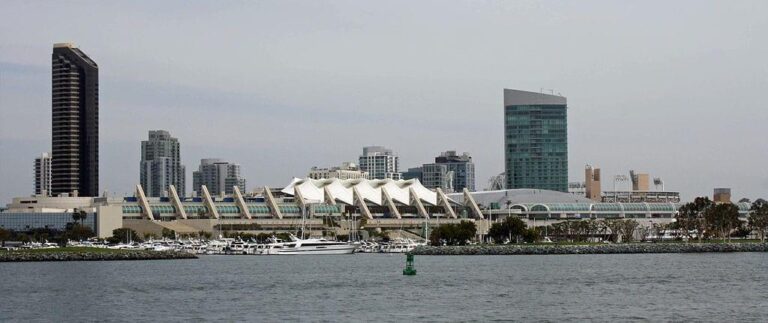The City of San Diego has filed a lawsuit against the federal government over its alleged withholding of grant funds designated for crucial public services, the BorderReport revealed. The legal action underscores growing tensions between local authorities and federal agencies amid ongoing disputes over funding allocations. The withheld grant money, originally intended to support public safety, infrastructure, and community programs, has prompted city officials to seek judicial intervention to secure the resources needed to serve San Diego residents effectively.
City of San Diego Takes Legal Action Over Withheld Federal Grant Allocations
In a bold move to secure needed resources, San Diego officials have initiated legal proceedings against the federal government, citing the unexplained withholding of critical grant funds designed to bolster public service programs. These funds, originally allocated to enhance community safety, healthcare access, and infrastructure improvement, remain inaccessible, potentially stalling numerous city projects aimed at improving residents’ quality of life. City leaders emphasize that the delay not only hampers immediate service delivery but also undermines long-term planning efforts crucial for urban development and social equity.
Key points raised by San Diego in the lawsuit include:
- Failure of federal agencies to provide transparent justification for withholding funds.
- Negative impact on essential services, including emergency response and homelessness programs.
- Demand for expedited release of withheld grants to mitigate ongoing public risks.
| Public Service Area | Allocated Grant Amount | Status |
|---|---|---|
| Emergency Response | $12 million | Withheld |
| Homelessness Programs | $8.5 million | Withheld |
| Public Health Initiatives | $5 million | Withheld |
Impact of Grant Delay on Local Public Services and Community Programs
The prolonged withholding of critical grant funds has severely hampered the City of San Diego’s ability to maintain and expand essential public services. Programs that cater to vulnerable populations—such as housing assistance, youth outreach, and emergency response initiatives—have faced drastic cutbacks. Local officials warn that the delay disrupts months of carefully laid plans, forcing a halt on new projects and reducing staffing levels in community centers across neighborhoods. This setback is not only impacting immediate service delivery but is also expected to have long-term repercussions on community welfare.
Key sectors affected include:
- Health outreach programs offering free vaccinations and medical screenings.
- Public safety initiatives, including police-community engagement efforts.
- Environmental projects aimed at improving green spaces and urban sustainability.
| Program | Funding Impacted | Service Consequence |
|---|---|---|
| Youth Mentorship | $750,000 | Program suspension |
| Emergency Medical Services | $1.2 million | Reduced availability |
| Community Housing Repairs | $900,000 | Delays to critical renovations |
Federal Government’s Justification and Response to San Diego Lawsuit
The federal government maintains that the withholding of funds entrusted to San Diego was a necessary measure to ensure compliance with certain regulatory criteria. Officials argue that several procedural requirements, including updated reporting metrics and adherence to federal guidelines on resource allocation, were not fully met by the city. Key points raised in the government’s defense include:
- Incomplete documentation supporting grant expenditures
- Concerns over fund usage transparency
- Pending audits related to prior grants
Furthermore, representatives from the Department of Homeland Security emphasized that the intent behind these policies is to promote fiscal responsibility and safeguard public investments. They have expressed a willingness to resume funding upon San Diego’s satisfactory resolution of the cited issues. To underscore their position, the government shared a summary of their evaluation process in a recent statement:
| Evaluation Criteria | Status | Resolution Timeline |
|---|---|---|
| Financial Reporting | Incomplete | 30 Days |
| Compliance Audit | Pending | 45 Days |
| Program Implementation | Needs Improvement | 60 Days |
Recommendations for Resolving Funding Disputes to Protect Essential Services
To effectively navigate funding conflicts and safeguard vital community programs, municipalities should prioritize establishing transparent communication channels with federal agencies. Proactive dialogue ensures that grant requirements and disbursement timelines are clearly understood, reducing ambiguity that often leads to disputes. Additionally, setting up dedicated liaison offices within city administrations can aid in swiftly addressing funding concerns before they escalate into litigation, preserving the continuity of essential public services.
Moreover, incorporating structured dispute resolution frameworks, such as mediation or arbitration clauses in grant agreements, can provide a faster, less adversarial alternative to lawsuits. Cities and federal bodies might also benefit from mutual accountability mechanisms, which can be summarized as follows:
- Joint oversight committees to monitor fund allocation and usage.
- Regular reporting schedules with transparent performance metrics.
- Clear penalty and remedy provisions to address funding irregularities promptly.
| Strategy | Expected Impact |
|---|---|
| Transparent Communication | Reduces misunderstandings and builds trust |
| Dispute Resolution Clauses | Speeds conflict resolution and avoids court delays |
| Mutual Accountability | Ensures responsible fund management and adherence |
The Way Forward
As the legal battle unfolds, the outcome of San Diego’s lawsuit against the federal government will have significant implications for public service funding in border communities. Stakeholders on both sides emphasize the critical nature of these grants in addressing the region’s unique challenges. City officials remain steadfast in their demand for the release of funds, underscoring their commitment to supporting vital programs that benefit residents and bolster public safety. Observers will be closely monitoring developments as this case progresses through the courts.







